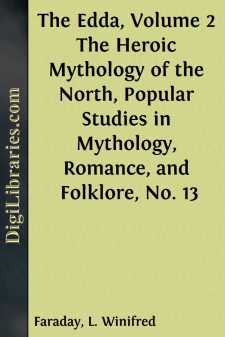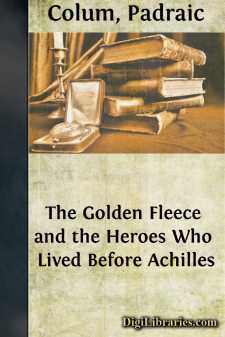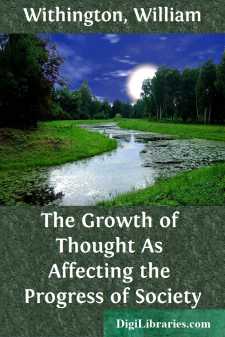Social Science
Social Science Books
Sort by:
The Heroic Mythology of the North Sigemund the Waelsing and Fitela, Aetla, Eormanric the Goth and Gifica of Burgundy, Ongendtheow and Theodric, Heorrenda and the Heodenings, and Weland the Smith: all these heroes of Germanic legend were known to the writers of our earliest English literature. But in most cases the only evidence of this knowledge is a word, a name, here and there, with no hint of the...
more...
INTRODUCTION The church and the school are the eyes of the country community. They serve during the early development of the community as means of intelligence and help to develop the social consciousness, as well as to connect the life within the community with the world outside. They express intelligence and feeling. But when the community has come to middle life, even though it be normally...
more...
PREFACE. Some explanation is due to the reader of the form and scope of these elaborations of the lectures which I have given at the John Rylands Library during the last three winters. They deal with a wide range of topics, and the thread which binds them more or less intimately into one connected story is only imperfectly expressed in the title "The Evolution of the Dragon". The book has been...
more...
CHAPTER I.a.d. 1307–1612. Origin of the name “Dean”?—The “Buck Stone,” and other Druidical remains—“The Scowles,” &c., and other ancient iron-mines, worked in the time of the Romans—Symmond’s Yat, and other military earthworks—Domesday Book, and investment of this Forest in the Crown—William I., and probable date of Free Miners’ Franchise—Castle of St. Briavel’s...
more...
THE PRIMARY aim of this book is to explain the remarkable rule which regulated the succession to the priesthood of Diana at Aricia. When I first set myself to solve the problem more than thirty years ago, I thought that the solution could be propounded very briefly, but I soon found that to render it probable or even intelligible it was necessary to discuss certain more general questions, some of which...
more...
by:
Padraic Colum
I. THE YOUTH JASON A man in the garb of a slave went up the side of that mountain that is all covered with forest, the Mountain Pelion. He carried in his arms a little child. When it was full noon the slave came into a clearing of the forest so silent that it seemed empty of all life. He laid the child down on the soft moss, and then, trembling with the fear of what might come before him, he raised a...
more...
Introductory. The meditation on human life—on the contrast between what is, and what might be, on supposing a general concurrence to make the best of things-yields emotions both painful and pleasing;—painful for the demonstrations every where presented, of a love of darkness, rather than light; pleasing, that the worst evils are seen to be so remediable; and so clear the proofs of a gradual, but...
more...
by:
Thomas Clarkson
CHAPTER I. No subject more pleasing than that of the removal of evils—Evils have existed almost from the beginning of the world—but there is a power in our nature to counteract them—this power increased by Christianity—of the evils removed by Christianity one of the greatest is the Slave-trade—The joy we ought to feel on its abolition from a contemplation of the nature of it—and of the...
more...
by:
Thomas Clarkson
CHAPTER I. Continuation from June 1788 to July 1789—Author travels to collect further evidence—great difficulties in obtaining it—forms committees on his tour—Privy council resume the examinations—inspect cabinet of African productions—obliged to leave many of the witnesses in behalf of the abolition unexamined—prepare their report—Labours of the committee in the interim—Proceedings...
more...
by:
Thomas Clarkson
CHAPTER I. HISTORY OF THE ABOLITION OF THE SLAVE TRADE. No subject more pleasing than that of the removal of evils.—Evils have existed almost from the beginning of the world; but there is a power in our nature to counteract them—this power increased by Christianity.—Of the evils removed by Christianity one of the greatest is the Slave Trade.—The joy we ought to feel on its abolition from a...
more...











